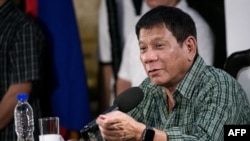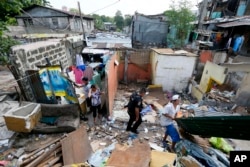Philippines President Rodrigo Duterte is one who has never shied away from controversy - not during the election process and not since taking office on June 30.
Last week, the Philippine President said he wishes to retire with the reputation of Idi Amin, the African ruler whose notorious regime was characterized by human rights abuses that killed at least tens of thousands of Ugandans.
Duterte also said that he’s not afraid of human rights concerns... that he will not allow his country to go to the dogs, and that he’ll pardon all abuses committed by security forces. He even went as far as to say he wouldn’t extend due process to those caught up in his anti-crime efforts.
“The human rights situation in the Philippines right now is dominated by [a] very alarming surge in police killings of suspected drug dealers and users,” says Phelim Kine, Deputy Director of the Asia Division at Human Rights Watch.
Kine adds, “…and with that, a surge in apparent extrajudicial killings by unidentified perpetrators of other people implicated in criminal activity in the Philippines.”
Kine says that this is occurring in the context of the recent inauguration of Duterte, who was elected on a platform that supported a vicious attack on criminal elements, promising “near biblical bloodletting of thousands of alleged criminals whose bodies he would dump into the Manila Bay.”
Philip Orchard, an East Asia Analyst with the Texas-based think tank Stratfor says that is Duterte’s preferred way of doing things. When it comes to the law, Duterte will “do anything that needs to be done, maintain enough plausible deniability about any direct linkages, and then try to justify things after the fact… and rely on political support to sort of carry him through and prevent any sort of backlash.”
It’s one thing to do that as mayor of Davao, Orchard says, but a little harder to do so when you’re the president and making these statements in front of reporters, but that Duterte “will joke about something that will make sense in one dialect, but not in another, so [this] allows there to be enough confusion, but people sort of give him the benefit of the doubt, take things with a grain of salt and don’t hold him too closely to his statements.”
“Both Human Rights Watch and domestic human rights groups were really hopeful that [the] threatening and very lurid bluster, in which he was threatening mass bloodletting once he became president would end once [he] became president,” says Phelim Kine, “but it’s continuing and... he is still talking about disregarding basic human rights and freedoms and protections of suspects built into the Philippine constitution.”
If what Duterte is saying is true, and that those actions will sidestep provisions in the Philippine Constitution, then one could argue those measures also would sidestep the rule of law, which is something Duterte is asking Beijing adhere to with respect to the Permanent Court of Arbitration.
Could that pose a problem for the Philippines? Orchard doesn’t believe it will “because international law is only as powerful and valid as the degree to which people agree to it.”
Meaning that since China, at least right now isn’t abiding by the decision, anything Duterte or the Philippine does, isn’t going to affect the situation. Orchard also notes that if things in the Philippines spiral out of control, that may earn Manila a rebuke from the regional group, though in general, he doesn’t think “the international community will come down too hard [on the Philippines], especially since the Philippines is such a strategic ally in the bigger issue on most country’s minds, which is the South China Sea.”






